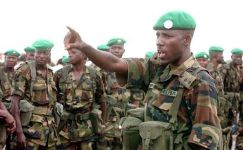UN hopes for beefed-up African force in Darfur by November
By ELLEN KNICKMEYER, Associated Press Writer
KHARTOUM, Sudan, Oct 1, 2004 (AP) — U.N. mission officials in Sudan said Friday they hope an expanded African force will be on the ground in Darfur by the end of October, after Sudan’s foreign minister agreed to allow in 3,500 outside troops.
 International leaders first must resolve logistics problems and supply shortages that have idled many of the 376-member African Union monitoring force already here, U.N. spokeswoman Radhia Achouri said.
International leaders first must resolve logistics problems and supply shortages that have idled many of the 376-member African Union monitoring force already here, U.N. spokeswoman Radhia Achouri said.
U.N. officials hope to get a strengthened force in “as near future as possible” for Darfur, where turmoil continues in a 20-month-old conflict that has killed more than 50,000 people and driven 1.4 million of Darfur’s non-Arab villagers from their homes.
The U.N. Security Council is investigating allegations leveled by the United States and others that Sudan’s Arab-dominated government and Darfur’s allied Janjaweed Arab militia are guilty of genocide.
Facing the genocide investigation and the threat of U.N. sanctions, Foreign Minister Mustafa Osman Ismail told the Security Council on Thursday that Sudan would accept 3,500 African Union troops for Darfur.
Sudanese media said Friday the number would include 800 African Union policemen.
Last week, Nigerian President Olusegun Obasanjo, who heads the AU, said the 53-nation body can quickly mobilize up to 5,000 troops to help end the looting and killing in Darfur, but it needs hundreds of millions of dollars to deploy the force.
The AU has 68 military observers in Darfur — a region about the size of France — protected by 308 soldiers, monitoring a rarely observed cease-fire signed in April by the government and rebels.
Europeans and Americans also have a limited presence on each AU monitoring team.
Lack of basic goods — including vehicles, uniforms and tents — have kept a significant number of the existing force from even starting work, African and European authorities say.
U.N. Sudan envoy Jan Pronk asked European nations last week to help with planes, vehicles, fuel and other needs, including planning.
Darfur’s conflict broke out after February 2003, when two non-Arab Darfur rebel movements — the Sudan Liberation Army and the smaller, Islamist-oriented Justice and Equality Movement — attacked government military targets here.
Rebels complained of Darfur’s marginalization by the Khartoum government.
As international criticism grew, Sudan’s government is acknowledged by most international officials and displaced people to have stopped alleged bombing runs on villages in recent months.
Attacks on civilians by unidentified militia continue, international officials and relief groups say, and the conflict also is seeing conventional clashes between rebels and government.
Sudan’s government has complained in recent weeks of repeated attacks on its police camps and other security positions, Achouri said.
African Union teams are investigating government claims the Sudanese Liberation Army is responsible, she said.
“We know, yes, these things are happening because there are a number of people dead, particularly from the police, but we don’t know who’s doing it,” she said.
